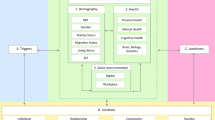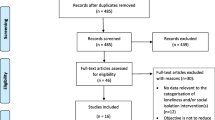Abstract
Background
Few studies have examined the psychosocial mechanisms through which self-reported discrimination may influence the health status of Latinos.
Purpose
This study examined the mediating role of subjective social status in the USA and psychological distress on the relation between everyday discrimination and self-rated physical health, and the moderating role of gender and ethnicity.
Methods
A US population-based sample of Latinos (N = 2,554) was drawn from the National Latino and Asian American Study. Respondents completed measures of everyday discrimination, subjective social status, psychological distress, and self-rated physical health.
Results
Path analysis revealed that among the total sample, subjective social status and psychological distress sequentially mediated the effect of everyday discrimination on self-rated physical health. Psychological distress was a more consistent mediator across Latino subgroups. Gender and ethnicity moderated the mediation model.
Conclusions
This study provides a systematic examination of how psychosocial mechanisms may operate differently or similarly across Latino subgroups.

Similar content being viewed by others
References
Passel JS, D’Vera C, Lopez H. Hispanics account for more than half of nation’s growth in past decade. Pew Hispanic Center http://pewhispanic.org/files/reports/140.pdf. 2011.
Alegría M, Shrout PE, Woo M, Guarnaccia P, Sribney W, et al. Understanding difference in past year psychiatric disorders for Latinos living in the U.S. Soc Sci Med. 2007; 65(2): 214-230.
Zsembik BA, Fennell D. Ethnic variation in health and the determinants of health among Latinos. Soc Sci Med. 2005; 61: 53-63.
Acevedo-Garcia D, Bates LM. Latino health paradoxes: Empirical evidence, explanations, future research, and implications. In: Rodriguez H, Saenz R, Menjívar C, eds. Latinas/os in the United States: Changing the Face of América. New York: Springer; 2008: 101-113.
Read JG, Gorman BK. Gender inequalities in US adult health: The interplay of race and ethnicity. Soc Sci Med. 2006; 62: 1045-1065.
Williams DR, Lavizzo-Mourey R, Warren RC. The concept of race and health status in America. Publ Health Rep. 1994; 109(1): 26-41.
Essed P. Understanding Everyday Racism: An Interdisciplinary Theory. Newbury Park, CA: Sage; 1991.
Harrell JP. A multidimensional conceptualization of racism-related stress: Implications for the well-being of people of color. Am J Orthopsychiatry. 2000; 70(1): 42-57.
Pérez DJ, Fortuna L, Alegría M. Prevalence and correlates of everyday discrimination among U.S. Latinos. J Community Psychol. 2008; 36(4): 421-433.
Araújo BP, Borrell LN. Understanding the link between discrimination, mental health outcomes, and life chances among Latinos. Hisp J Behav Sci. 2006; 28(2): 245-266.
Lee DL, Ahn S. Discrimination against Latinos: A meta-analysis of individual-level resources and outcomes. Couns Psychol. 2012; 40(1): 28-65.
Suarez-Orozco M, Paez M. Latinos: Remaking America. Berkeley, CA: University of California Press; 2009.
Mendelson T, Rehkopf D, Kubzansky LD. Depression among Latinos in the United States: A meta-analytic review. J Consult Clin Psychol. 2008; 76(3): 355-366.
Suarez-Orozco C, Suarez-Orozco MM. Children of Immigration. Cambridge, MA: Harvard University Press; 2001.
Portes A, Rumbaut R. Legacies: The Story of the Immigrant Second Generation. Berkeley, CA: University of California Press; 2001.
Crocker J, Major B, Steele C. Social stigma. In: Gilbert D, Fiske ST, Lindzey G, eds. The Handbook of Social Psychology, vol. 2. 4th ed. New York: McGraw-Hill; 1998: 504-553.
Thompson MN, Subich LM. Social status identity: Antecedents and vocational outcomes. Couns Psychol. 2011; 39: 735-763.
Adler NE, Epel ES, Castellazo G, Ickovics JR. Relationship of subjective and objective social status with psychological and physiological functioning: Preliminary data in healthy White Women. Health Psychol. 2000; 19(6): 586-592.
Kraus M, Piff PK, Keltner D. Social class, sense of control, and social explanation. J Pers Soc Psychol. 2009; 97(6): 992-1004.
Dovidio JF, Gluszek A, John M-S, Ditlman R, Lagunes P. Understanding bias toward Latinos: Discrimination, dimensions of difference, and experience of exclusion. J Soc Issues. 2010; 66(1): 59-78.
Fiske ST. Interpersonal stratification: Status, power, and subordination. In: Fiske ST, Gilbert DT, Lindzey G, eds. Handbook of Social Psychology. 5th ed. New York, NY: Wiley; 2010: 941-982.
Franzini L, Fernandez-Esquer ME. The association of subjective social status and health in low-income Mexican-origin individuals in Texas. Soc Sci Med. 2006; 63: 788-804.
Brondolo E, Hausmann LRM, Jhalani J, et al. Dimensions of perceived racism and self-reported health: Examination of racial/ethnic differences and potential mediators. Ann Behav Med. 2011; 42: 14-28.
Fernando S. Racism as a cause of depression. Int J Psychol. 1984; 30: 41-49.
Operario D, Adler D, Williams DR. Subjective social status: Reliability and predictive utility for global health. Psychol Health. 2004; 19(2): 237-246.
Miller G, Chen E, Cole SW. Health psychology: Developing biologically plausible models linking the social world and physical health. Ann Rev Psychol. 2009; 60: 501-524.
Cole ER. Intersectionality and research in psychology. Am Psychol. 2009; 64(3): 170-180.
Zambrana RE, Dill BT. Disparities in Latina health: An intersectional analysis. In: Schultz A, Mullings L, eds. Race, Class, Gender and Health. San Francisco, CA: Jossey-Bass; 2006: 192-227.
Aranda MP, Castaneda I, Lee PJ, Sobel E. Stress, social support, and coping as predictors of depressive symptoms: Gender differences among Mexican Americans. Soc Work Res. 2001; 25(1): 37-48.
Hurtado A, Sinha M. More than men: Latino feminist masculinities and intersectionality. Sex Roles. 2008; 59: 337-349.
Williams DR. The health of men: Structured inequalities and opportunities. Am J Public Health. 2003; 93(5): 725-731.
Finch BK, Kolody B, Vega WA. Perceived discrimination and depression among Mexican-origin adults in California. J Health Soc Behav. 2000; 41(3): 295-313.
Jackson B, Kubzansky LD, Wright RJ. Linking perceived unfairness to physical health: The perceived unfairness model. Rev Gen Psychol. 2006; 10(1): 21-40.
Ostrove JM, Adler NE, Kuppermann M, Washington AE. Objective and subjective assessments of socioeconomic status and their relationship to self-rated health in an ethnically diverse sample of pregnant women. Health Psychol. 2000; 19(6): 613-618.
Rivera FI, Guarnaccia PJ, Mulvaney-Day N, et al. Family cohesion and its relationship to psychological distress among Latino groups. Hisp J Behav Sci. 2008; 30: 357-378.
Alegría M, Takeuchi D, Canino G, et al. Considering context, place and culture: The National Latino and Asian American Study. Int J Methods Psychiatr Res. 2004; 13(4): 208-220.
Heeringa SG, Wagner J, Torres M, Duan N, Adams T, Berglund P. Sample designs and sampling methods for the Collaborative Psychiatric Epidemiology Studies (CPES). Int J Methods Psychiatr Res. 2004; 13: 221-240.
Alegría M, Vila D, Woo M, et al. Cultural relevance and equivalence in the NLAAS instrument: Integrating etic and emic in the development of cross-cultural measures for a psychiatric epidemiology and services study of Latinos. Int J Methods Psychiatr Res. 2004; 13(4): 270-288.
Williams DR, Yu Y, Jackson J, Anderson N. Racial differences in physical and mental health: Socioeconomic status, stress, and discrimination. J Health Psychol. 1997; 2: 335-351.
Reeve BB, Willis G, Shariff-Marco SN, et al. Comparing cognitive interviewing and psychometric methods to evaluate a racial/ethnic discrimination scale. Field Methods. 2011; 23(4): 397-419.
Kessler RC, Andrews G, Colpe LJ, et al. Short screening scales to monitor population prevalences and trends in non-specific psychological distress. Psychol Med. 2002; 32: 959-976.
Crowne DP, Marlowe D. A new scale of social desirability independent of psychopathology. J Consul Psychol. 1960; 24: 349-354.
Taylor AB, MacKinnon D, Tein J-Y. Tests of the three-path mediated effect. ORM. 2008; 11: 241-269.
Muthén LK, Muthén BO. Mplus User’s Guide. 3rd ed. Los Angeles, CA: Muthén and Muthén; 1998–2006.
Aiken LS, West SG. Multiple Regression: Testing and Interpreting Interactions. Thousand Oaks, CA: Sage Publications; 1991.
Pearlin LI, Lieberman MA, Menaghan EG, Mullan JT. The stress process. J Health Soc Behav. 1981; 22: 337-356.
Cooley CH. Human Nature and the Social Order. New York, NY: Scribner; 1902.
Paradies Y. A systematic review of empirical research on self-reported racism and health. Int J Epidemiol. 2006; 35: 888-901.
Richman LS, Leary MR. Reactions to discrimination, stigmatization, ostracism, and other forms of interpersonal rejection: A multimotive model. Psychol Rev. 2009; 116(2): 365-383.
Purdie-Vaughns V, Eibach RP. Intersectional invisibility: The distinctive advantages and disadvantages of multiple subordinate-group identities. Sex Roles. 2008; 59: 377-391.
Xu Y. Ethnic variations in the relationship between socioeconomic status and psychological distress among Latino adults. Race Soc Probl. 2011; 3: 212-224.
Polo A, Alegría M. Psychiatric disorders and mental health service use profile of Latino men in the United States. In: Aguirre-Molina M, Borrell L, Vega W, eds. Health issues in Latino males: A social and structural approach. New Brunswick, NJ: Rutgers University Press; 2010: 183-211.
Pavalko EK, Mossakowski KN, Hamilton VJ. Does perceived discrimination affect health? Longitudinal relationships between work discrimination and women’s physical and emotional health. J Health Soc Behav. 2003; 43: 18-33.
Pew Hispanic Center. 2007 National Survey of Latinos: As Illegal Immigration Issue Heats Up, Hispanics Feel a Chill. Washington, DC: Pew Hispanic Center; 2007.
Bzostek S, Goldman N, Pebley A. Why do Hispanics in the USA report poor health? Soc Sci Med. 2007; 65(5): 990-1003.
Borrell LN, Dallo FJ. Self-rated health and race among Hispanic and non-Hispanic adults. J Immigr Minor Health. 2008; 10: 229-238.
Acknowledgments
This research was based on the doctoral dissertation of the first author, who was partially supported by a National Science Foundation Graduate Research Fellowship and a Rackham/Women’s Studies Department Dissertation Fellowship. Preparation of this manuscript was supported by a postdoctoral fellowship awarded to the first author, funded through a National Heart, Lung and Blood Institute Training Grant (T32HL007426). The authors gratefully acknowledge Laura Klem and Heidi Reichert for their guidance on the statistical analyses, as well as Lilia Cortina, Debra J. Pérez, and Michael Spencer for insightful feedback on this study. We are also thankful for the helpful comments and suggestions of the anonymous reviewers and the Associate Editor, Tracey A. Revenson. Any errors or omissions are the responsibility of the authors alone.
Conflict of Interest
The authors have no conflict of interest to disclose.
Author information
Authors and Affiliations
Corresponding author
Additional information
Portions of this manuscript were presented at the American Public Health Association annual meeting, Denver, CO 2010 and the National Cancer Institute’s The Science of Research on Discrimination and Health Conference, Bethesda, MD 2011. The research in this manuscript won first place in the 2012 American Association of Hispanics in Higher Education/Educational Testing Services’ Outstanding Dissertation Competition.
About this article
Cite this article
Molina, K.M., Alegría, M. & Mahalingam, R. A Multiple-Group Path Analysis of the Role of Everyday Discrimination on Self-Rated Physical Health among Latina/os in the USA. ann. behav. med. 45, 33–44 (2013). https://doi.org/10.1007/s12160-012-9421-2
Published:
Issue Date:
DOI: https://doi.org/10.1007/s12160-012-9421-2




